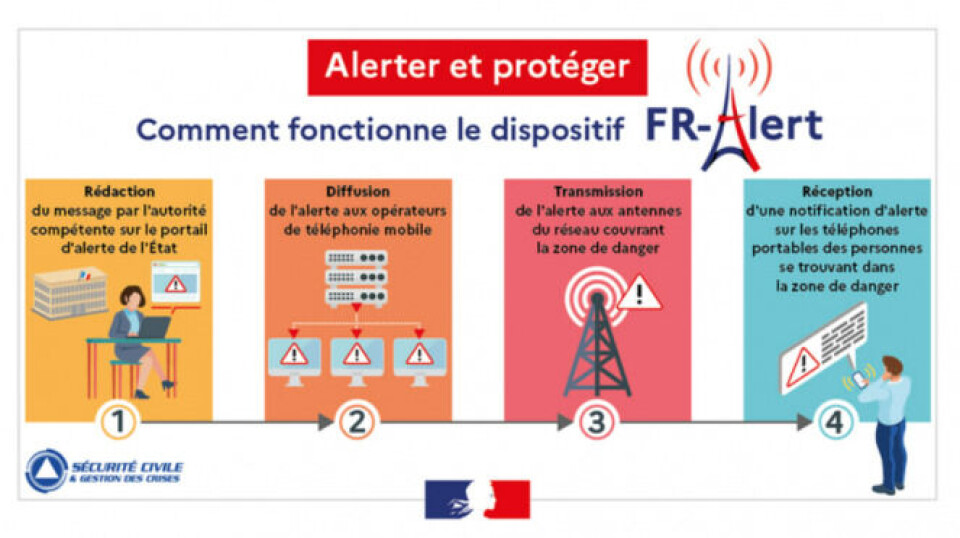-
More than 5,000 French communes use AI to identify poor rubbish sorting
Badly-sorted rubbish can cost millions so communes are turning to high-tech solutions
-
Tax on well-off retirees under consideration for 2026 budget
‘Nothing is off the table’ when it comes to finding €40 billion in savings says Labour Minister
-
Nice airport records passenger boom as tourists flock to city
Airport figures exceeded the pre-Covid record last year, with US visitors significant contributors
Floods, terrorist attacks: New mobile alert system in France
The FR-Alert system, which does not need an app to work, is set to be deployed from the end of June
France is to introduce a new alert system, dubbed FR-Alert, which will enable authorities to alert everyone in a particular area of a major incident, without users needing an app or to read a text message.
The system will be deployed at the end of June. It will be in addition to current communications from emergency services (such as those on social media).
It will be used for emergencies and major incidents, such as the flooding and violent storms that killed one person and injured 15 over the weekend.
Read more: One death, 15 people injured as violent storms hit France
The alert will make a noise and vibrate the phone even if it is ‘on silent’. However, phones that are off, without any signal at all, or those on ‘flight mode’ will not receive an alert.
It will contain details of the risk, its location, and any behaviour required by people in that area to ensure their protection. No sign-up for the system is necessary, and it will not enable the state to gather location information of users.
In a statement, the Interior Ministry said the system would be used “any type of major event that justifies alerting the population concerned to ensure their safety”.

Image: Screenshot / Interieur.gouv.fr
The kinds of events that will see the system deployed include:
-
Natural disasters (floods, storms and cyclones, fires, tsunamis, volcanic eruptions)
-
Biological and chemical accidents (pollution, gas leaks, nuclear incidents)
-
Health accidents (epidemics, pandemics, agri-food incidents)
-
Technological and industrial accidents (breakdown of telecommunication systems, serious accidents on road, rail or air networks, industrial incidents)
-
A serious public security event or an act of terrorism.
The system was announced in 2020 after the Lubrizol fire in Rouen. It will be operational by the end of the month (June). An EU directive had pushed France to have such a system in place by June 21.
Cell broadcast tech
The technology works not via SMS, but by cell broadcast, which uses radio waves from telecommunication antennas. This means that the SMS network will not be saturated, in case of alerts being sent to a large number of people.
Cell broadcast technology is already in use in several European countries, as well as the US and Japan.
The system is still being tested, so some people may receive a message within the context of a trial by the Sécurité civile. For example, from May 16-19, a system test meant that some people received messages in Bouches-du-Rhône, which caused some concern.
However, before the end of the month “receiving a notification will not require any action by the population, nor any behaviour to be respected”, the ministry said.
Second system attempt
This is the second time that France has attempted to create a notification system, but the previous one required an app. The ‘SAIP’ system, launched in 2016, was considered to be a failure after few people downloaded the required app.
It also failed to work on a number of major occasions, such as the Nice terrorist attacks, and during a terrorist incident at a supermarket in Aude in March 2018.
The app was deactivated in 2018 and until now, authorities have mainly communicated alerts via social media, television, and radio.
Related articles
How does the point system work on French driving licences?
New map shows you the cheapest petrol near you in France
























